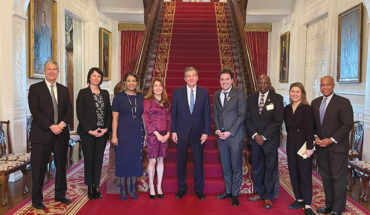
Peter Millar chairman and CEO Scott Mahoney
has taken the brand from the fairway to the
boardroom, and on to a worldwide marketplace.
by Liza Roberts
photographs by Missy McLamb
When Lindsay Browder leaves her historic home in Oakwood for work this fall morning, it’s warm enough for shorts. That’s fine at her office, where her yellow Lab, Palmer, is welcome, too. He trots beside her as she bikes the few blocks north.
In a converted cotton mill behind Peace College, Browder, 29, designs clothes. It’s a tip of the hat to the building’s heritage – and a very cool space. The lofty ceilings, giant windows, and exposed brick make a picture-perfect designer’s lair. And a mellow place for her dog to take a nap, a colleague to play indie rock, and for co-workers to throw the odd patio pig roast.
It looks like Raleigh. It feels like Raleigh. In every sense of the word, the company Browder works for is local. But practically speaking, Peter Millar – the clothing maker where she works as women’s design manager – is anything but. It’s a lucrative rising star on an exclusive international stage. The company, which also has a vast warehouse in Durham, could rack up sales of nearly $100 million this year, industry experts say.
In fact, the brand’s reach is so broad, its clothes so widely worn, and its local profile so modest, that it’s not hard to find Peter Millar lovers in town who don’t realize their favorite shirt maker is around the corner. Don’t know it was founded here by Fuquay-Varina native Chris Knott, is run here by Raleigh local Scott Mahoney, and that the City of Oaks is woven into their favorite shirt’s every fiber.
That’s because Peter Millar, in its own exclusive, limited-distribution fashion, is everywhere.
In addition to 1,200-plus golf clubs and resorts in America, Peter Millar’s sportswear can be found in Neiman Marcus and Nordstrom, at more than 400 U.S. specialty stores, and in retailers around the world, from Seoul to St. Andrews.
“We’ve had an insane amount of luck,” says Mahoney, the company’s chairman and CEO, clad in his brand from head-to-toe and comfortable in his office of sleek sofas and artful photographs. He oversees 143 local employees, a number that’s quadrupled in four years. “We took a great product and we’ve been able to build it.”

Design manager Marcus Cecconi, merchandising manager Will Thompson, and founder Chris Knott compare notes on ideas for Spring 2014. Swatches like these are everywhere.
More than golf buddies
If golf is part of your life, you know Peter Millar. It’s the brand inside the collar of countless tournament and club shirts and sweaters; it’s the logo worn by the 2010 U.S. Ryder Cup team, the 2011 U.S. President’s Cup team, and anyone sporting 2013 Masters gear. It’s on PGA pros like FedEx Cup champions Brandt Snedeker and Bill Haas.
But if Peter Millar met its customer on the course, it’s no longer content to remain just golf buddies. More and more, Mahoney is nudging the brand beyond the course. Using golf as a gateway, he’s convincing that buddy to buy sport coats and shoes, suits and ties, boxers and socks, swim trunks and performance sports gear. Its new Pick Stitch line, featuring finely detailed tailored clothing, takes it all one refined step further. So far, it’s working: Nongolf products now represent more than 60 percent of sales.
Mike Bowers, a former PGA professional who works as the company’s vice president of design and merchandising, travels the world to find fabrics and manufacturers to create clothes for every occasion. He brings his athlete/executive’s perspective with him when he jets to Beijing, Taipei, Bangkok, and beyond.
“We get to see it all through from conception to reality, to seeing someone wear it – anywhere.”
When the company was sold last year to the Swiss luxury conglomerate Richemont group (which also owns jewelers Van Cleef & Arpels, Montblanc pens, and Baume & Mercier watches, among many others), Peter Millar gained the international perspective and deep pockets it needs to think big. Richemont is known for buying successful brands that have markets of their own and then letting them do what they do best.
The company’s DNA remains pure City of Oaks, says local founder Knott. It’s a huge part of why he thinks it succeeded to begin with, and why it continues to tap into its market so effectively.
“Here, we’re with real people. If I lived in SoHo, I’d probably be out of business,” he says. “I’d lose my perspective. I’m not coming at this as an artist, I’m a merchandiser. My question is: Will this sell? And our customer is here.”
That kind of practicality is not very “fashion.” But it is very Raleigh. Another key factor is the cost of doing business here, and how that translates to the bottom line. Bypassing the expense of New York-based showrooms, warehouses, salaries, and distribution – which most of the company’s competitors must pay – is a huge part of the Peter Millar equation, Mahoney says.
“What we are able to do is deliver better products at better prices.” If Peter Millar’s competition is “anyone who sells a shirt,” as he claims, then Mahoney has his work cut out for him.
It helps, he thinks, that Raleigh allows him to live the life of his customer. That’s often a man who works hard but plays golf, has a busy social life, stands on more than his share of kids’ sports sidelines, and wants something nice to wear to all of it. “We’re self-aware,” says Mahoney, 48. “We know what we are. We are our market. We make clothes for real people, and if we won’t wear it, we won’t make it.”
Modest start
Making finely tailored suits and selling them worldwide is a long way from the company’s initial success on the golf course – and its humble beginnings in 2001. That’s when Knott, whose many years in retail began at 14 at Fuquay’s Ashworth’s Clothing, launched his sideline sweater business. At that point, Knott had been representing high-end men’s clothing lines like Hugo Boss, Joseph Abboud, and Burberry for almost 20 years. He saw a hole in the market for brightly colored, fairly priced cashmere sweaters, and wanted to fill it. His ambitions were modest: “I was just trying to generate some income for my family,” he says.
He had the sweaters made, then sold them like hotcakes wherever he went, especially in resort areas. “Palm Beach colors” like tangerine, purple, and hot pink were top sellers. Soon he was making golf shirts, too. His trick was to think like a customer.
He knew subtle luxury would sell – like thick, mother-of-pearl buttons similar to the ones on Italian designer shirts – at non-Italian-designer prices, and without narrow, Italian-designer fits. He chose fine fabrics and colors that were unexpected, but not strange. His contacts were great, his overhead was low, his prices reflected it, and he couldn’t keep his stuff in stock.
Looking for an aristocratic-sounding name to brand his new venture, he spied one on an old leather lawn bowling ball of his mother’s, and Peter Millar it was.
When Polo golf and tennis executive Scott Mahoney came across Knott’s clothes at Sea Island resort in Georgia, he was impressed. “They were really good,” he says, in terms of quality and price. “And they had a worsted cashmere vest that was the coolest thing I really had ever seen.”
Cool enough to inspire a career change. In 2005, Mahoney left Polo and brokered a deal whereby he and Sea Island Company bought Peter Millar, while Knott retained a healthy stake. The deal “gave a fledgling company credibility,” he says. “You take 80 years of Sea Island history, and Peter Millar becomes part of that.”
“That” also meant golf. Both men are serious golfers, so the fit was natural. Mahoney – who commuted from Connecticut at first, and then moved to Raleigh with his family – ran with it. He got the shirts on the backs of countless PGA players, on Golf Channel sportscasters, and into the pro shops of golf clubs and resorts everywhere. “You turn on a golf event on any given Saturday, and we’re there,” Mahoney says. “And that didn’t cost us anything.”
Then, in 2009, when the economy was taking a beating, Sea Island sold its majority stake to a Chicago private equity firm, Winona Capital. The move was key, Mahoney says. It forced Peter Millar to “leave no stone unturned” in reducing inventory, honing strategy, and planning forward. “Sea Island gave us credibility, and private equity gave us great financial discipline.”
The thinking now is that Richemont will open Peter Millar to a wider world, taking the Raleigh company’s international business from 5 percent of sales to 30 to 40 percent over the next three to four years.
And, Mahoney and Knott hope, it will accelerate the move from golf brand to straight-up luxury brand. Reigning Fed Ex Cup champion Brandt Snedeker, who wears Peter Millar on the tour, has drunk that Kool-Aid. “Most of my clothes that I wear when I am not playing golf are Peter Millar,” he says.
In the 60,000-foot Durham warehouse where Peter Millar clothes constantly arrive from places like Peru, China, and Italy, pickers roll carts down aisles to fill orders. Packers get them ready to ship out to customers. And embroiderers work overtime to stitch custom logos on to all kinds of merchandise.
The feathered headdress of the logo for Shinnecock Hills, the 121-year-old golf club in Southampton, N.Y., is getting sewn in to a pile of shirts. Color by color, stitch by stitch, a computerized embroidery machine takes eight minutes to finish each one.
Other machines take their time stitching logos for New Jersey’s Baltusrol club, Trump National Golf Club, the ACC, Texas A&M University, and Virginia Tech University. There are 10,000 logos in the company’s database, three-quarters of which are regular orders. It’s not just shirts. “If you can put a needle through it, we can embroider it,” says Allen Rowe, vice president of operations.
Every shirt, sweater, or pair of pants needs to be steamed after its logo is sewn on, then folded, and re-wrapped before going back into a shipping box. A FedEx trailer stands at the open warehouse door, slowly filling up as the day goes on.
Knott, who spends most of his time developing new products and meeting with customers, isn’t concerned that these numbers – this growth – will dilute the brand. He has a clear idea of what the company is and what it isn’t. “We’re current, but not modern,” he says. “We are classic with a twist. On-trend, but not trendy. We’re not expensive. We’re an accessible luxury.” With golf shirts that sell for less than $100, sweaters for about $200, and pants in the range of $125 to $250, the company’s prices are often lower than competitors like Ralph Lauren. And their products retain that element of specialness – through details like buttons, collars, colors, and fabrics – that Knott worked to create. “In a short amount of time, Peter Millar has become an important supplier for menswear for Neiman Marcus,” says Russ Patrick, the department store’s general merchandise manager. “Every season they are able to innovate and refresh their collection.”
The look and feel of the brand has a team behind it, but its origins lie with Knott. His office is filled with fabric swatches, and his conversation is peppered with references to color, design, pattern, and the number of centimeters in a collar spread. Details. When the tissue paper in which Peter Millar’s clothes were wrapped for shipment didn’t crinkle the way Knott thought it should – in a way he believed spoke of quality – he had it coated. “I wanted it to make noise. I wanted crisp paper.” He demonstrates with a sheet that sounds – well, like tissue paper crinkling. “Isn’t it great?” Knott says.
He, Mahoney, and their team believes small touches like this matter. From the beginning, Knott says, he put himself in the shoes of the buyer. So he made sure every store’s delivery was packed to correspond exactly to its order sheet. When a buyer opened a box of Peter Millar clothes, her order sheet would list shirts and sweaters in a variety of colors and sizes. Underneath, they’d be stacked in just that order, from top to bottom. And there were always a few wrapped butter mints tossed in, too, the kind you find at clubs and old-fashioned restaurants.
The idea was to entice that store manager to open Knott’s box first. To get Knott’s clothes on the racks first. All of that’s still happening today, butter mints and all. Cases of them, made and wrapped in blue by Hospitality Mints of Boone, N.C., sit at the packers’ station. Thousands get tossed into boxes every day.
Lucky breaks
There’s a lot of talk about luck and serendipity when Mahoney and Knott consider how they got to here from there.
The coup of getting their clothes into Neiman Marcus, for instance. It happened when James Gold, then the department store’s top executive, admired his golf partner’s shirt at a member-guest tournament in Boston. When he heard that his partner had paid less than $100 for the shirt, Gold stepped off the course to send an email to the general mailbox at Peter Millar: “I’d like to see all of your line,” he said, to no one in particular. Mahoney happened to see it, and now his clothes are in 35 of the chain’s 42 stores.
On another golf course, this one in Southampton, Mahoney ran into Eric Gleacher, founder of the investment bank Gleacher & Co. Mahoney told Gleacher that Winona, the private equity firm, might be interested in realizing its profits in Peter Millar. Gleacher told Richemont CEO Johann Rupert. Within days, Mahoney was in talks to sell the company.
Once the deal was done, there was no question about whether Peter Millar should move to grow. In fact, Mahoney says, the cooler Raleigh gets, the more the city helps the company get its work done.
Raleigh helps recruit the best talent. It helps sales.
Instead of traveling to meet buyers at Neiman Marcus stores across the nation, for instance, Peter Millar flies in all those folks, showcases its line in its Pilot Mill showroom that’s built to look like a retail store, gets their feedback on designs in the works, and takes them out on the town.
“They come here, and they get what Peter Millar is,” Mahoney says. It’s dinner at Poole’s Diner, and on the rooftop of the Raleigh Times. It’s Glenwood South and burritos at Dos Taquitos, and it’s this converted cotton mill office, a workspace so covetable nobody wants to leave. It’s also the clothes, shown with the casual elegance and real-world feeling of the city that spawned them.
“We’ve embraced Raleigh, and we want to show it off,” Mahoney says.






